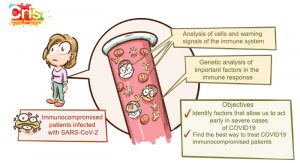Principal Investigators:
Dr. Silvia Sánchez Ramón, from the Immunology Service, with the collaboration of Dr. Alberto Ocaña and Dr. Pedro Pérez Segura from the Medical Oncology Service and CRIS UNIT for New Experimental Therapies
Centres: Hospital Clínico San Carlos.
Current situation
SARS-Cov-2, the coronavirus that has led to the COVID19 epidemic, has marked a turning point in the global health situation. Although in the vast majority of cases, the virus causes mild symptoms, in some cases, it can trigger severe lung problems that can end the patient’s life in a very short time.
Thanks to the cooperative research effort conducted since the start of the epidemic, it is understood that the immune system plays a key role in the development of this disease. In fact, one of the risk factors that seem to predispose an individual to developing a severe form of COVID19 would appear to be immunosuppression.
There are several types of immunosuppression. Some people are born with mutations in an important gene in the immune system, which can limit the ability of their defences to fight infection. This is what we call primary immunodeficiencies. On the other hand, there are secondary or acquired immunodeficiencies, which can develop throughout a person’s life as a result of other causes, including some forms of cancer, especially blood (or haematological) cancers.
Even though these patients would seem to be at greater risk, there is very little data on the behaviour of the virus in these patients and how their immune system reacts. It is very important to determine exactly what is happening and what is going wrong in such vulnerable patients so that we can find the most effective ways to combat it.
The aim of the project
The Hospital Clínico San Carlos has embarked on an ambitious project, which will involve the active participation of the CRIS Unit for New Experimental Therapies, led by Dr. Alberto Ocaña and Dr. Perez Segura.
The overall aim is to analyse in great detail the immune response of patients with primary and secondary immunodeficiencies(including patients with cancer) when infected with the SARS-CoV-2 coronavirus.

The different components of the immune system of these patients when they are infected with this virus will be analysed at a cellular and genetic level.
The researchers will look for relationships between certain alterations in the immune system, and how patients progress.
Markers will be identified to predict, when patients are admitted to hospital, if their progress is likely to be good or bad, in order to anticipate and find solutions as quickly as possible (which would save many lives)
Patients taking part in this study:
- Patients without previous pathologies but who, because of the way the illness progresses, might have undiagnosed immunodeficiencies.
- Patients with diagnosed primary immunodeficiencies
- Patients with secondary immunodeficiencies, especially patients with cancer
Budget
The total cost of conducting this project at the Hospital Clínico San Carlos is €150,000.
This budget can be broken down as follows:
- Cell biology and immunodetection reagents: €30,900
- Cell culture reagents: €10,000
- Reagents for mass sequencing: €12,000
- Molecular biology reagents: €18,000
- Cell Signalling: € 16,000
- Senior biosciences technician (x1): €35,000
- Exomes/bioinformatics software services: € 22,000
- Dissemination: € 5,000
- Project registration, monitoring and filing costs: €1,100
- Total: €150,000